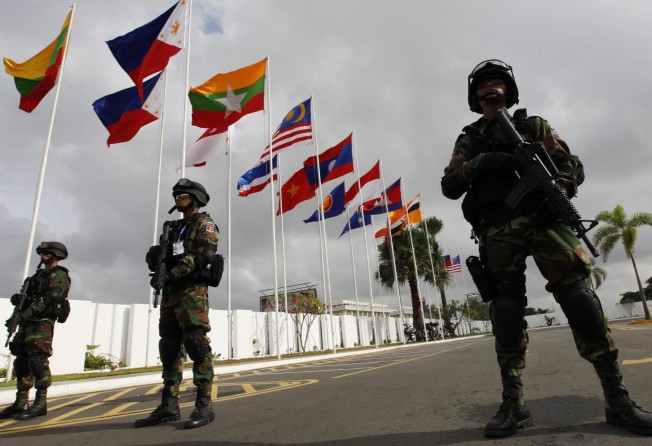Asean summit unlikely to seal code of conduct with China
Regional summit this week unlikely to agree on code of conduct to reduce maritime tensions, and that will play into Beijing's hands

This week's gathering of regional leaders in Cambodia won't witness a breakdown in talks between foreign ministers over the South China Sea, as happened at their last meeting in July, but nor is it likely to see agreement on the issue.
Diplomats and analysts say a sense of drift has settled over efforts to forge a legally binding code of conduct between Asean nations and China to reduce tensions over the sea - and that suits Beijing just fine.
Asean's target of reaching an agreement this year will be missed, with Chinese officials having repeatedly stressed they will start talks on Asean's draft of the code "when the time is ripe". They also insist that actual territorial disputes in the sea should be settled one-on-one between China and individual claimants, not as a grouping - a clear advantage for Beijing.
As officials from the 10 nations of the Association of Southeast Asian Nations met ahead of the arrival over the next two days of the leaders of China, the US, Japan, South Korea, India, Russia, Australia and New Zealand, Indonesian envoys warned of a "long road ahead" on the code.
After the Asean foreign ministers' meeting, secretary general Surin Pitsuwan called for a hotline between Southeast Asian countries and China to defuse tensions. "We can give it a sense of urgency that, if there is anything developing that we all will be phoned … trying to consult, trying to coordinate, trying to contain any possible spillover of any … incident, accident, miscalculation, misunderstanding," he said in Phnom Penh.
As the Chinese delegation, headed by Premier Wen Jiabao prepared to leave Beijing, Deputy Foreign Minister Fu Ying yesterday insisted the dispute was under control and China did not want it overshadowing wider talks in Phnom Penh this week.
She also made clear that Beijing did not want other "outside" powers directly involved to "hype up" the issue - a reference to rising concern in Washington over it. "Discussion of the South China Sea issue should return to the framework of China and Asean. Discussing the issue in other forums will interfere with the direction of cooperation," Fu said.
Despite the warning, US President Barack Obama is widely expected to repeat American concerns when he arrives tomorrow. The need to forge ahead with a meaningful code is likely to be a key part of that effort - with a declaration that was signed a decade ago between China and Asean having failed to prevent the tensions of recent years.
Obama and Wen are due to meet privately as well as staging meetings with all 18 members of the East Asia Summit. Both leaders will also meet separately with Asean.
Obama arrives in Cambodia fresh from winning a second term as president, but other leaders are on their way out.
As well as Wen, preparing to vacate his office for the incoming Li Keqiang , Japanese Prime Minister Yoshihiko Noda is not expected to win re-election next month and South Korean President Lee Myung-bak is also in his political twilight, having served the single five-year term allowed in the country.
If Obama does push the issue, few diplomats are expecting the fireworks of July, when arguments over how to handle South China Sea issues saw the 10 foreign ministers of Asean fail to produce an annual joint communiqué for the first time in the grouping's 45 years.
The Philippines pushed for specific references to its dispute with China over the Scarborough Shoal, called Huangyan Island by the Chinese, but faced fierce objections from host Cambodia, which was later accused of doing China's bidding. Manila has been pushing hard for progress.
"We'll get through the next few days without that kind of damage this time," said a veteran Asean diplomat.
"But the pace of significant progress is becoming glacial, I fear, and the threat of real trouble is always there."
Dr Ian Storey, a strategic scholar at Singapore's Institute of South East Asian Studies, said he believed a "best case" scenario would be if China agreed to start serious talks with the group Asean next year.
"It doesn't mean it is going to happen," Storey said. "Singapore and Indonesia have been trying to cajole China along, but it seems to be in Beijing's interests not to be hurried over this in any way."
China claims practically the entire South China Sea, including the Spratly and Paracel archipelagoes, through its controversial nine-dotted line. Its claim bisects rival claims of the Philippines, Vietnam, Malaysia and Brunei.
Additional reporting by Agence France-Presse